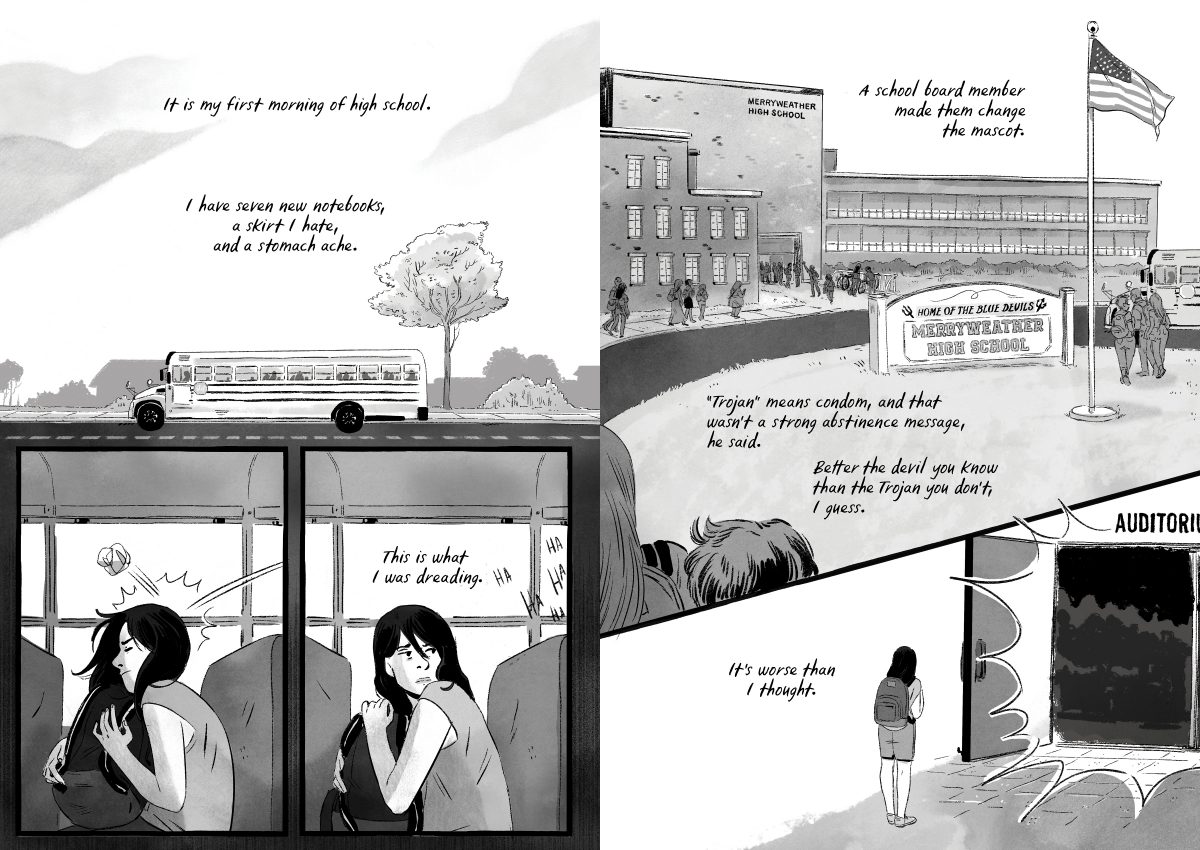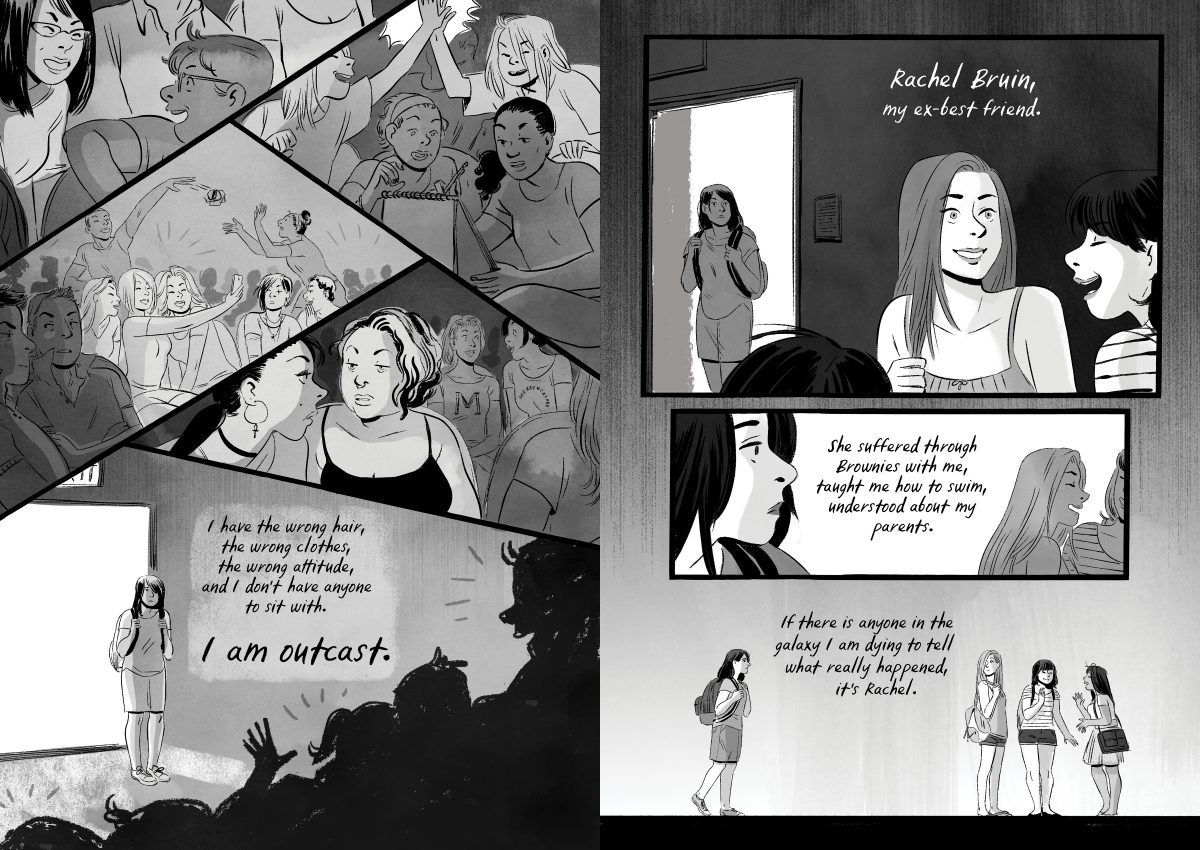Adding Speak to your Library
or Classroom
More than twenty years ago, Laurie Halse Anderson exploded on to the literary scene with her YA book Speak, an award-winning tale the New York Times said, “opened the door for more novels exploring the deeply felt and deeply personal aftermath of sexual violence.” Now Anderson has been joined by illustrator Emily Carroll for the graphic adaptation, Speak, to bring a hauntingly new version of the tale to an entirely new generation of readers. Many teachers and librarians are familiar with Speak and there’s little doubt that most will want to add the new graphic novel adaptation to their classroom or library. This CBLDF reference is to help everyone add Speak to their curriculum or collection with confidence, offer tips for preventing challenges, and guidance in case a challenge is made.
From the Publisher
“Speak up for yourself — we want to know what you have to say.” From the first moment of her freshman year at Merryweather High, Melinda knows this is a big fat lie, part of the nonsense of high school. She is friendless — an outcast — because she busted an end-of-summer party by calling the cops, so now nobody will talk to her, let alone listen to her. Through her work on an art project, she is finally able to face what really happened that night: She was raped by an upperclassman, a guy who still attends Merryweather and is still a threat to her. With powerful illustrations by Emily Carroll, Laurie Halse Anderson’s Speak: The Graphic Novel comes alive for new audiences and fans of the classic novel.

Praise
“Treating a sensitive subject with grace, skill, and compassion, this often dark exploration of sexual assault and its aftermath does the issue justice.” — Common Sense Media, 5/5 Stars
“This potent retelling of the modern classic Speak blends words and images to create magic: a new representation of a teen whose voice is ripped from her, the battles she must wage to find it again, and the triumph of finally being able to speak out. Carroll’s grayscale artwork perfectly depicts the starkness of Melinda’s depression through strong ink lines and striking panels that rely on pencil and charcoal textural effects for the backgrounds. The characters are distinct and the action flows naturally; it is amazing how closely this version evokes the style and feeling of the original. The dialogue is pulled directly from the novel and enhances the progression of the story and of Melinda’s emotions.” — School Library Journal, Starred Review
“Carroll’s skill comes to fruition in not only her adaption of the mood and emotion of the story but in the depictions of the small moments and expressions that helped make Speak the critically acclaimed novel it is. To see how Carroll depicts that moment when teenagers begin to unravel who their parents are, flaws and all, with a single expression–is a testament to the strength of her immense talent. It never feels contrived or forced, it feels as natural as if you were seeing it for yourself.” — Comics Beat Review
“Melinda relies upon art to work as a vulnerary; this visual adaptation takes readers outside Melinda’s head and sits them alongside her, seeing what she sees and feeling the importance and power of her desire to create art and express herself. Carroll’s stark black-and-white illustrations are exquisitely rendered, capturing the mood through a perfectly calibrated lens. With the rise of women finding their voices and speaking out about sexual assault in the media, this reworking of the enduring 1999 classic should be on everyone’s radar.” — Kirkus, Starred Review

Awards
For the Graphic Novel
A School Library Journal Best Book
Booklist Youth Editors’ Choice
A YALSA Great Graphic Novel Reading List Selection
A YALSA Teens’ Top Ten List Selection
A Quill & Quire Best Kids’ Book
Amelia Bloomer Best Feminist Book for Young Readers
Amelia Bloomer Top Ten Book
Eisner Award Nomination
Little Maverick Graphic Novel Reading List Selection
The EBSCO See-It Award Winner
An ILA Young Adult Reading List Selection
A Kids’ Comics Award Nominee
Eliot Rosewater Indiana High School Book Award Winner
For the Novel
1999 National Book Award Finalist
BCCB Blue Ribbon Book
2000 SCBWI Golden Kite Award for Fiction
Horn Book Fanfare Best Book of the Year
ALA Best Books for Young Adults
Printz Honor Book
Top Ten Best Books for Young Adults
Fiction Quick Pick for Reluctant Young Adult Readers
Edgar Allan Poe Best Young Adult Award Finalist
2001 New York Times Paperback Children’s Best Seller
2005 New York Times Paperback Children’s Best Seller
Additional Resources
CBLDF’s Using Graphic Novels in Education: Speak
More Info about Laurie Halse Anderson
More info about Emily Carroll
Teachers Guide
Discussion Guide
What should I do if Speak is challenged?
Most challenges to comics in libraries come from well-meaning individuals, frequently parents, who find something they believe is objectionable in their local public or school library. These challenges are often difficult and stressful for the library staff who must manage them, but there are resources to help them in the process. Below we’ve identified a number of tips and links to assist libraries to increase the likelihood of keeping challenged comics on the shelves.
1. Make Strong Policies.
Strong selection and challenge review policies are key for protecting access to library materials, including comics. The American Library Association has developed a number of excellent tools to assist school and public libraries in the essential preparation to perform before books are challenged here.
2. Face the Challenge.
What do you do when a comic is challenged? Much of the material in this post can be used to help defend Speak against a challenge. The American Library Association has developed these helpful tools to cope with challenges:
- Conducting a Challenge Hearing
- Strategies and Tips for Dealing with Challenges
- Sample Request for Reconsideration of Library Resources
CBLDF can also help by providing assistance with locating review resources, writing letters of support, and facilitating access to experts and resources. Call 800-99-CBLDF or email info@cbldf.org at the first sign of a First Amendment emergency!
3. Report the Challenge.
Another essential step in protecting access to comics is to report challenges when they occur. By reporting challenges, you help the free expression community gather necessary information about what materials are at risk so better tools can be created to assist. To report a challenge to the Comic Book Legal Defense Fund, call us at 800-99-CBLDF or email info@cbldf.org. You can also report the challenge to the Kids’ Right to Read Project, a CBLDF-sponsored program from the National Coalition Against Censorship, and one of our frequent partners in the fight against censorship. Finally, you can report the challenge to ALA here.